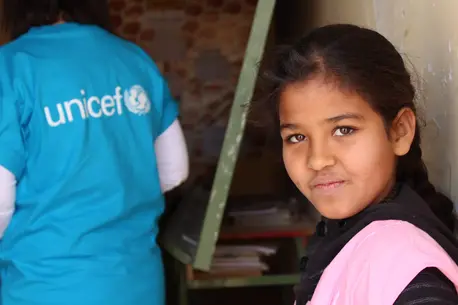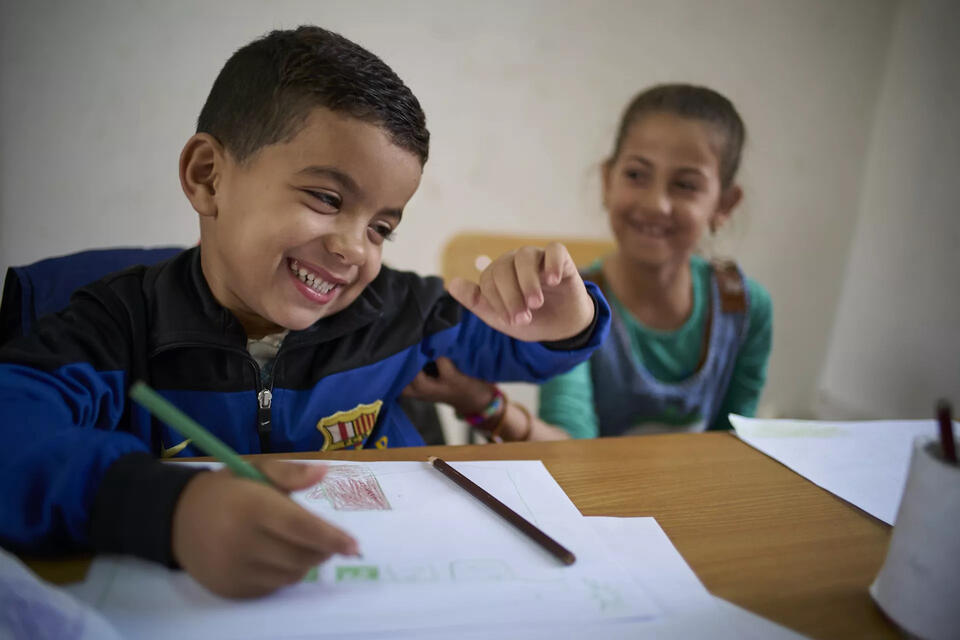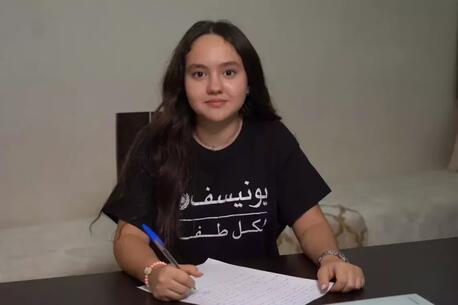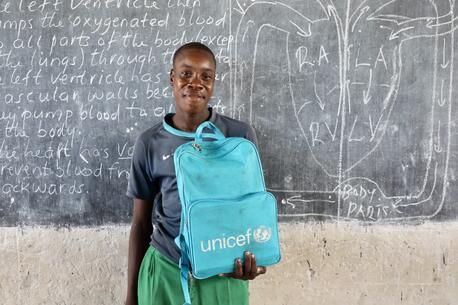
UNICEF in Algeria
Algeria continues to make great strides in improving children's lives. UNICEF collaborates with the Algerian government to help strengthen critical systems and reach the most vulnerable with health care, nutrition support, education and protection. Learn more, including how to help.
Challenges for children in Algeria
Since its independence from France in 1962, Algeria has made enormous progress in promoting the rights of children.
UNICEF's mission in Algeria supports the country's efforts to advance progress toward the Sustainable Development Goals. As a strong government partner, UNICEF provides strategic insights, resources and technical expertise on matters pertaining to the well-being of children, especially the most vulnerable, including Sahrawi refugee children living in the southwestern province of Tindouf.
How UNICEF is helping children in Algeria
UNICEF programming in Algeria focuses on four areas: education, health care, child protection and social policy.
In health, UNICEF provides essential services like vaccinations and maternal care to help safeguard the well-being of mothers and children. Related priorities include:
- collaborating with the Ministry of Health to improve access to quality health care services
- assisting in widespread vaccination coverage by procuring digital monitoring devices, training health staff and organizing activities to increase awareness and efficacy of child immunization
- supporting the launch of the new vaccination calendar by designing and printing new vaccination and health booklets for 1 million children
- strengthening emergency response capabilities with a robust alert system for public health crises
- engaging communities to increase awareness and participation in polio vaccination campaigns
- upgrading oxygen systems in hospitals to enhance maternal and child health care services
In education, UNICEF is focused on:
- collaborating with the Ministry of Education to enhance early childhood education standards
- providing practical training sessions for teachers and developing digital resources for classrooms
- implementing measures to identify and support students at risk of dropping out of school
- expanding vocational training opportunities for vulnerable adolescents
- promoting inclusive education practices for children with disabilities
- integrating sports programs into school curricula

Safeguarding children's rights in Algeria
UNICEF also works in Algeria to help fortify child protection systems — playing a pivotal role in advocating for robust laws and policies aimed at shielding Algeria’s children from various forms of violence, abuse and exploitation. This work involves:
- strengthening national capacities in developing and implementing child-friendly justice procedures and legal reform processes in line with international standards
- training police on child rights and gender issues, as well as procedures on child abductions and disappearances, profiling techniques and cybercrime and computer investigations
- providing technical expertise to help design child-friendly interview rooms
Through strategic partnerships with government agencies and civil society organizations, UNICEF also:
- actively engages in policy dialogue and legislative advocacy to address gaps in child protection frameworks
- continues to collaborate with the Algerian government to develop and strengthen child welfare services, establish reporting mechanisms for cases of abuse and provide support for victims
- conducts training programs for Algerian professionals working with children, equipping them with skills and knowledge to identify and respond to cases of violence and exploitation more effectively
How UNICEF supports child refugees in Algeria
Among the world’s most vulnerable people are the Sahrawi refugees living in five refugee camps near the city of Tindouf in southwestern Algeria. Some have been there for nearly half a century, victims of a protracted and often forgotten crisis that began decades ago in Western Sahara — a war that forced people to flee in search of safety.
The region’s harsh climate and extreme weather conditions make it virtually impossible to grow food, making these refugees almost entirely dependent on humanitarian aid and food assistance for their survival.
UNICEF plays an important role in providing essential support to Sahrawi refugees, particularly children, in Tindouf. Collaborating closely with partners like UNHCR (the UN Refugee Agency) and the World Food Program, UNICEF contributed significantly to the development of a joint Sahrawi Refugee Response Plan, which focuses on enhancing inter-agency coordination and fundraising for Sahrawi children.
UNICEF's health care initiatives in Algeria — including timely vaccine procurement and midwife training — have improved access to health care and support for maternal and child nutrition. UNICEF has distributed school kits to thousands of Sahrawi children, supported teacher trainings and implemented literacy programs, among other measures that help ensure access to quality education.
Strong partnerships with government ministries, civil society organizations and UN agencies further underscore UNICEF's commitment to advancing child rights and social protection among the Sahrawi. Through its multifaceted approach, UNICEF continues to make a tangible impact on the lives of this vulnerable community.
Learn more about how UNICEF supports child refugees and other children on the move around the world.
UNICEF works in over 190 countries and territories to ensure children are healthy, educated, protected and respected. Unrestricted donations provide UNICEF with the flexibility to adapt to changing needs and deploy resources where and when they are needed most. Support UNICEF. Donate today.


